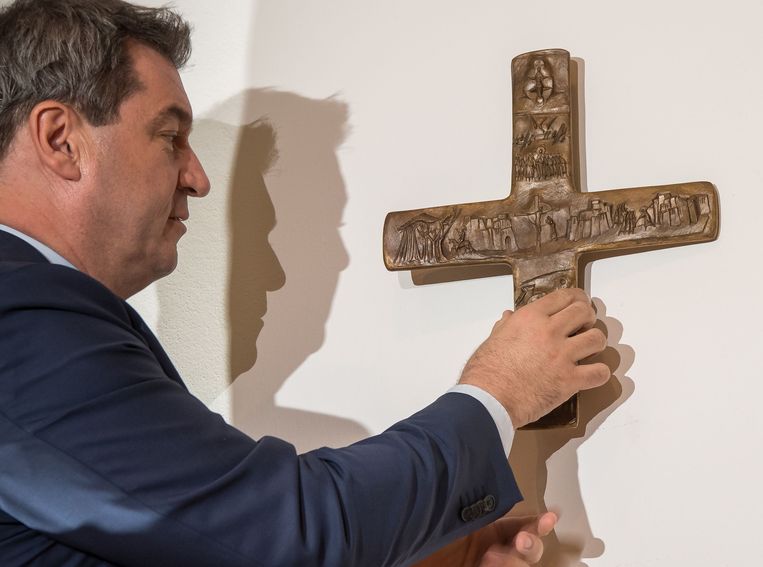Bavarian State Prime Minister Markus Söder already hung a crucifix in April 2018 at the chancellery. Image AFP
In 2018, Bavarian State Prime Minister Markus Söder of the Christian Social Union (CSU) decreed that all public buildings must prominently display a cross “as an expression of Bavaria’s Christian and cultural character.” Advocates of ‘the meaningful separation of church and state and of the eradication of ecclesiastical privileges’ had challenged the obligation to hang crucifixes. According to them, the measure violated freedom of religion and the constitutional requirement for the government to remain neutral in matters of faith.
Bavaria is the state with the second largest Catholic population in Germany. In the most recent census from 2011, about 55 percent called themselves Catholic, 21 percent Protestant and 6 percent Muslim. The rest do not adhere to any faith or belong to any other than the three dominant beliefs. Only Saarland has more Catholics among its residents (63 percent).
The administrative judge gives short shrift to those objections from the Association for Free Thinking for Bavaria (BFG Bayern). The court recognizes that ‘the crosses brought in represent a central symbol of the Christian faith to an objective observer’. But it calls the regulation “a purely administrative regulation with no external legal effect and therefore does not violate any rights of the claimants.”
The opponents are now considering what paths they can take to achieve their right. One of those options is that they submit the case to the Federal Constitutional Court – Germany’s highest court. “It’s not over yet,” BFG Bayern president Assunta Tammelleo said.
Division
When State Prime Minister Söder announced the decree five years ago, it led to heated debates. The CSU leader and his party would use the cross as a political instrument to create sentiment, especially against Muslims, to take the wind out of the sails of the far-right Alternative for Germany (AfD). The mandatory hanging of the crucifixes was introduced four months before the elections, in which CSU suffered heavy losses.
The Protestant church leadership was one of the organizations that spoke out. The Catholic Church appeared divided. The Archbishop of Munich, Cardinal Reinhard Marx, said in an interview at the time that he likes to see crucifixes everywhere, but that an obligation repulses him. ‘Now there has been division, unrest and strife. Anyone who sees the cross only as a cultural symbol has not understood it.’
Just before the administrative judge’s ruling, the cardinal made it clear to journalists that he was not against crosses. “They are part of our history.” He also pointed out all the crosses hanging on facades and along roads and in schools. “I also don’t worry that crosses would disappear from the Bavarian street scene.”
Also read
2023-12-21 15:30:00
#Bavaria #nail #cross #wall #government #building #administrative #judge
